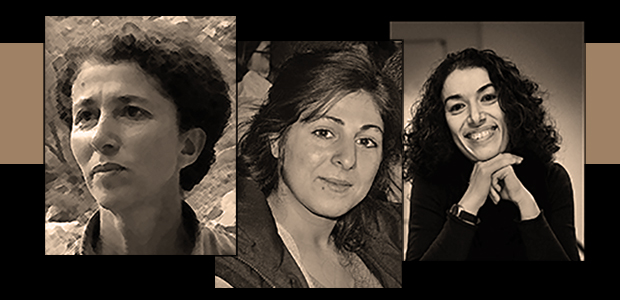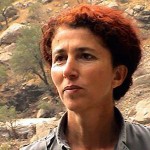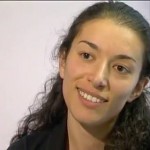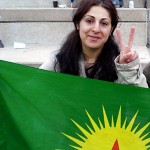
ANF, PARIS – One year ago today (09.01.2013), Sakine Cansız, Fidan Doğan and Leyla Şaylemez were brutally murdered in the French capital Paris. They were hit in a place they considered safe, the office Fidan was going to everyday to do her job: a meticulous, diplomatic work to get French politicians aware and informed on the crime and repression against Kurds.
Cansız was a co-founder of the Kurdistan Workers Party (PKK), Fidan Doğan, the representative of the Kurdistan National Congress (KNK) in Paris, and Leyla Şaylemez, member of the Kurdish youth movement.
Three women, three generations of Kurdish women committed at different levels and in different fields tirelessly working both to denounce the persecution of Kurds and for a path toward a just and lasting peace through dialogue.
Both issues (exposing the violence against a people of 40 millions and working for peace) were the target of those who ordered the murder. The hand which pulled the trigger may well as been that of the “suspect” arrested two days after the killings. Ömer Güney was the last who saw the three women alive. He was with them in the office. French investigators accuse him of being the killer. If this indeed were the case, the trial will show.
But the case is proceeding very slowly. To date no hearing has been scheduled as the investigation is not over yet.
In an article published in December, the French magazine Express said there has been rapid progress made in the investigation into the murders of three Kurdish women revolutionaries in Paris on 9 January. It noted that “suspicions regarding Ömer Güney have been strengthened by the latest findings”, and that “the supposition of a political murder on a background of espionage is gaining credibility”.
According to the article by Eric Pelletier, there has been rapid progress made in the investigation after the examination of new documents, and “new evidence strengthens suspicions regarding the sole suspect, Ömer Güney”.
The Express article explained that in the police laboratory near Ecully photos that had been deleted from the memory of Güney’s Nokia mobile phone had been retrieved, proving that Güney had on the night before the murders entered the Kurdish association in Villiers-le-Bel and photographed the membership information. The article continued: “At between 4.30 and 5.30 am, he carefully photographed 329 membership forms… he succeeded in entering the premises by using spare keys” According to the magazine Ömer Güney admitted taking these photographs, but claimed he did it on the orders of the PKK.
Express also drew attention to the German angle, saying “friends and colleagues in the Munich area describe him as quiet, and someone who ‘wouldn’t even hurt a fly’. But according to them, Ömer Güney was far from being in favour of autonomy. On the contrary, it is claimed he was close to the nationalist party MHP, and that he frequently went to the firing range. Two witnesses also said he had a ring with 3 crescent moons on it. One remembers that he had a Turkish flag in his room and that he had a passion for Galatasaray.”
The magazine recalled that investigators had examined Ömer Güney’s visits to Turkey, pointing out that his most recent visit had been between mid-December and the end of December 2012, shortly before the murders. Express also noted Ömer Güney’s phone calls to Turkey, adding: “investigators established that the suspect had five phones with French and Turkish cards, with two of them still missing.” The magazine pointed out that Ömer Güney had sent dozens of text messages to “unusual numbers”, that resembled “technical numbers” The magazine stated that investigators are to ask for assistance from their counterparts in Ankara in order to establish with whom he spoke “so often and in such a clandestine way”
In the article in ANF on 15 December, Antoine Comte, the lawyer for the relatives of the 3 Kurdish women, said that “great progress” had been made in the investigation and that evidence “indicated Turkey” and that there were “many elements indicating Turkish state responsibility” Comte said that In order for the Turkish state to speak to the whole of Europe, not just to the French, the issue must become a Europe-wide one, adding:
“The Turkey connection to the murderer, telephone conversations and technical data is known. There are many elements that point to Turkish state responsibility. I don’t know whether the relationship with Turkey pertains to extreme right wing groups. He is someone who has many links to the most radical Turkish extremists. He has three crescent moons on his ring.”
However, the details cannot be checked without help from Turkey, Antoine Comte, a lawyer for the Kurdish victims in France said. The reality is nothing seems to have moved as to a precise line of inquiry aimed at answering vital questions: who ordered the killings ? How could such a murder be carried out in a city like Paris, on a busy road such as Rue Lafayette ?
More, to which extent (if any) is Turkey “collaborating” to the inquiry especially since, as Comte said, records of Güney’s phone activity with Turkey were placed in the investigations file in July, five months after his arrest. Who was he meeting during his trips to Turkey ? Who was he talking to ? Why ? Who is Güney ?
All these questions remained unanswered and justice remains far and so does truth. One year has gone by since that sad 9 of January.
Kurds are preventing this vicious murder to end up forgotten or being put aside. They cannot be left alone because this is a murder which concerns the very democratic and justice values professed by Europe. This is a murder which concerns Europe not just because it was committed in an European city but also because it proved that there are those who – in Europe – feel safe to act knowing they would benefit or some kind of impunity. This is something Europe should reflect upon very seriously and act very quickly.
Rendition flights, political murders, kidnappings “approved” by some governments, denial of permission to land or fly to presidential planes: all of this questions the very freedom and independence Europe boasts so much about but clearly does next to nothing to really defend.
These questions must be answered. Soon.
Sakine Cansiz (Sara)
 Cansız, a co-founder of the PKK (Kurdistan Workers’ Party) and one of the three Kurdish activists murdered in Paris last year, was born in the province of Dersim in 1957. Having been active in the student youth movement in Elazığ for long years, Cansız joined the Kurdish revolutionary movement in 1976.
Cansız, a co-founder of the PKK (Kurdistan Workers’ Party) and one of the three Kurdish activists murdered in Paris last year, was born in the province of Dersim in 1957. Having been active in the student youth movement in Elazığ for long years, Cansız joined the Kurdish revolutionary movement in 1976.
Cansız, a leading figure in the struggle against fascist circles in Elazığ, was mainly active in the neighborhoods of Fevzi Çakmak and Yıldızbağları. Joining political works in and around Dersim in 1978, Cansız became fully involved in the revolutionary movement after that time.
After attending the PKK Congress on 27 November 1978, she was arrested in Elazığ and sent to prison together with a group of friends. She was subjected to heavy torture in the period of the 12 September military coup in 1980. She was released in 1991.
Soon after her release, she continued to take an active part in revolutionary activities in West and South Kurdistan.
After many years of struggle on Kurdistan mountains, Cansız went to Europe where she started to lead the Kurdish women’s organization. She was one of the inspiring and prominent women who made great contributions to the association and organization of Kurds in diaspora.
Fidan Doğan (Rojbin)
 Doğan, one of the two other Kurdish women killed in Paris last year, was born in the Elbistan district of Maraş province on 17 January 1982. As a daughter of an immigrant family in Europe, she grew up in France.
Doğan, one of the two other Kurdish women killed in Paris last year, was born in the Elbistan district of Maraş province on 17 January 1982. As a daughter of an immigrant family in Europe, she grew up in France.
Doğan, who took a strong interest in Kurdistan Freedom Struggle since her childhood, started to take an active part in revolutionary works in Europe as of 1999. Besides her works which mainly focused on youth and women, Doğan also took part in diplomacy activities in Europe as of 2002. She was both a member of the Kurdistan National Congress and Paris representative of the establishment.
Leyla Şaylemez (Ronahi)
 Şaylemez, daughter of an Ezîdi family from Diyarbakýr’s Lice district, was born in the southern province of Mersin. She spent her childhood here until her family moved to Germany in 90’s.
Şaylemez, daughter of an Ezîdi family from Diyarbakýr’s Lice district, was born in the southern province of Mersin. She spent her childhood here until her family moved to Germany in 90’s.
She had been studying at the Department of Architecture for one year when she joined the Kurdistan Freedom Struggle. After 2006, she started to take an active part in many European cities, particularly in Berlin, Köln, Hannnover, Frankfurt and Swiss city of Basel.
After spending one and a half year in Kurdistan in 2010, she returned to Paris where she had been conducting works since then.
Source: Firat News Agency